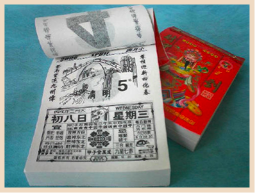
Todd Jay Leonard, Blog


In my last column, I discussed Japanese superstitions related to death. Today, I am following a similar theme by concentrating on superstitions related to numbers and days.
Of course, superstitions concerning numbers are quite plentiful in both cultures. Few Americans fail to notice a "Friday the 13th" (one is approaching in October!). Japanese people also have superstitions related to numbers; the number four has an ominous meaning in Japan because it is pronounced the same as the Japanese word for death. Just as American hospitals and high-rises sometimes avoid using the number 13 for floor and room numbers, a similar custom is followed in Japan with regard to the number four.
The reason Western cultures avoid the number 13 is connected to Christianity. It comes from the Last Supper that Jesus held before his trial and crucifixion; there were 13 who attended, and Judas, who betrayed Jesus, was among them. Jesus also was crucified on a Friday, which, when combining the day and number, makes a Friday the 13th very unlucky.
It is also believed by some that Eve tempted Adam with the apple from the Tree of Knowledge on a Friday the 13th, the Great Flood of the Old Testament started on a Friday the 13th and the Tower of Babel confusion occurred on a Friday the 13th.
Christians always refer to the 12 disciples of Jesus, and even today most place settings for formal dinners come in sets of 12. It is considered unlucky to have 13 guests at one's table. The same is true in Japan in that it is impossible to find a set of four of anything - plates, glasses, cutlery and so on. Most everything in Japan comes in sets of five to avoid the unlucky four connection.
Also, in Japan, the number nine is considered unlucky in hospitals because it is pronounced the same as the word for pain (ku). Many Japanese superstitions related to numbers come from a type of double entendre or pun in the pronunciation of the word. The lucky number seven has Biblical roots as well for Western cultures. Jews and Christians believe that God created the heavens and the earth in six days and rested on the seventh; Noah's rainbow had seven colors; there are seven sins - pride, wrath, envy, lust, gluttony, avarice and laziness; Salome performed a dance of the seven veils; and the Beast of the Apocalypse has seven heads. The number seven, hence, is also closely related to religion.
The number seven is highly significant in Jewish religious tradition because it represents perfection and signifies completeness. Christians adopted this belief of viewing the number seven as being auspicious as well. Next year, since July 7, 2007, falls on a Saturday - 07-07-07 - I am sure that many couples who are planning to get married will select this day because of its lucky implications. As well, I am sure casinos will be brimming with customers next year on July 7 in the hope that the lucky day will somehow translate into big winnings.
Perhaps the modern connotation of this superstition was imported to Japan from the West, but Japan does have a tradition of viewing the number seven as lucky. For instance, in Buddhism, there are the "Seven Gods of Good Luck" - Benten, goddess of love; Bishamon, god of war; Daitoku, wealth; Ebisu, modesty; Fukurokuju and Jurojin, gods of long life; and Hotei god of merriment. A clever American friend of mine started a wine-import company here and named it "Hotei" which is one of the seven gods of good luck. It is quite successful and ever-expanding.
The traditional six-day Buddhist calendar, imported from China in the 14th century and practiced in Japan from the mid-Edo period (1600-1868), still makes modern people superstitious about certain days considered to be auspicious and others that are regarded as being very unlucky. The six-day calendar (rokuyo) is divided as "taian," "butsumetsu," "sempu," "tomobiki," "shako" and "sensho." The luckiest of the six days is taian, and Japanese people will often seal business deals and many engaged couples choose to marry on this day.
Butsumetsu is considered to be a very unlucky day; hence people avoid doing anything important on this day. If possible, Japanese people try not to have a loved one's funeral held on tomobiki, because it is believed that the deceased person may try to bring the living to the underworld by invite another death soon after.
Every year, in December, many businesses, such as banks and taxi companies, will give out calendars to their customers. Many of these calendars feature fortunes. An example of a fortune is: "Sempu - Urgent business and controversy should be avoided on this day. It is a good day for going about other activities in a serene manner. The afternoon is auspicious."
Just as many Americans will read their daily horoscopes, I am sure that a goodly number of Japanese people make a point to check their calendars each day to see if it is an auspicious or inauspicious day facing them. If it happens to be a butsumetsu day, then they will be anxious and tense all day long; but if it happens to be a taian day, then they most likely will be happy and at ease.
By TODD JAY LEONARD
Columnist
Have a nice day: It's all in knowing the right numbers
Monday, August 14, 2006






